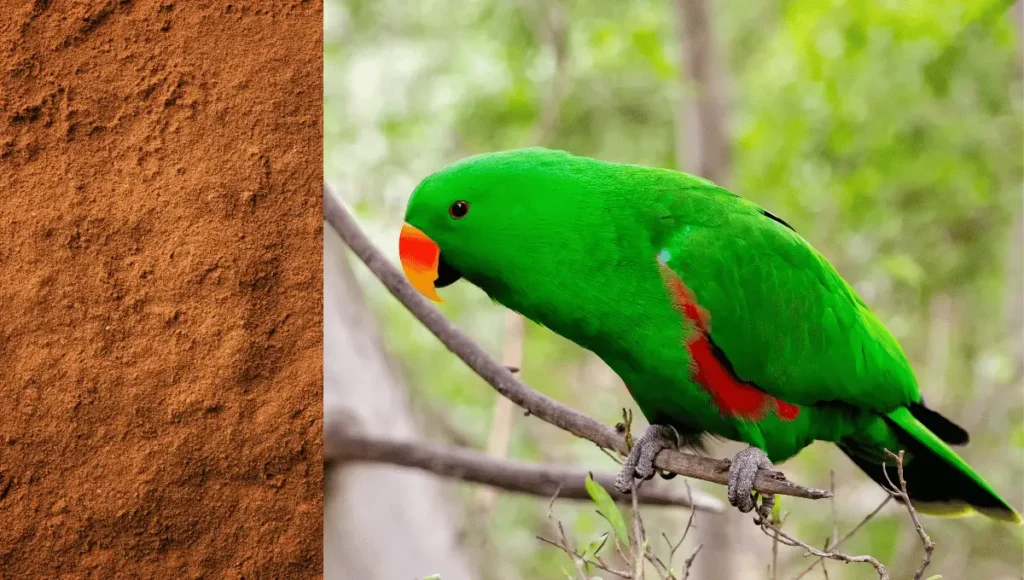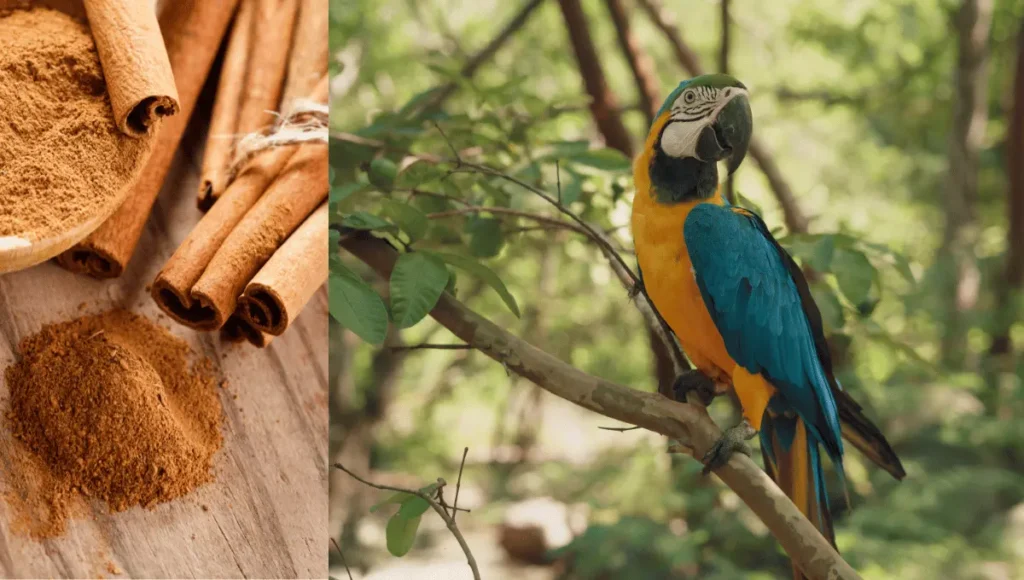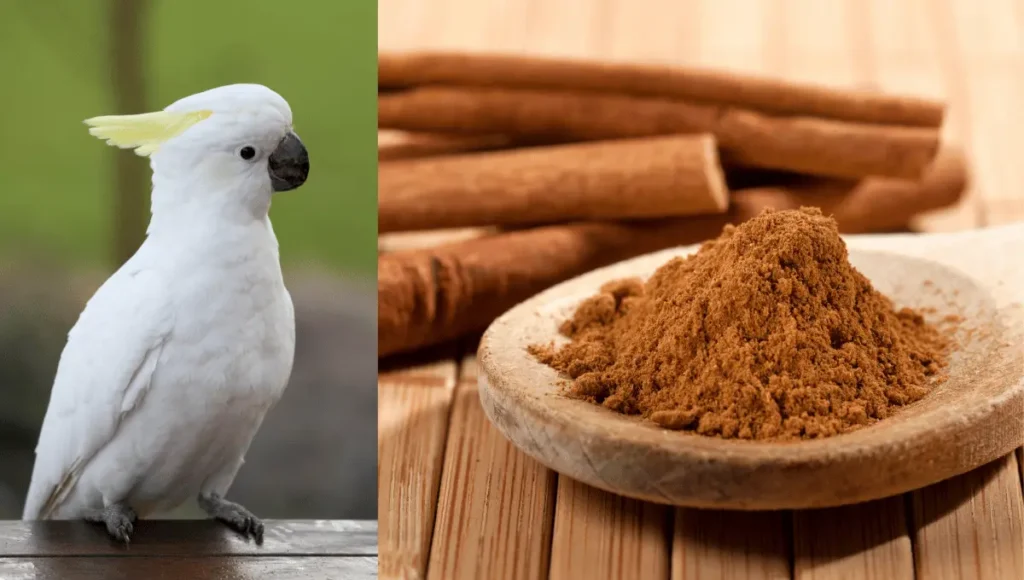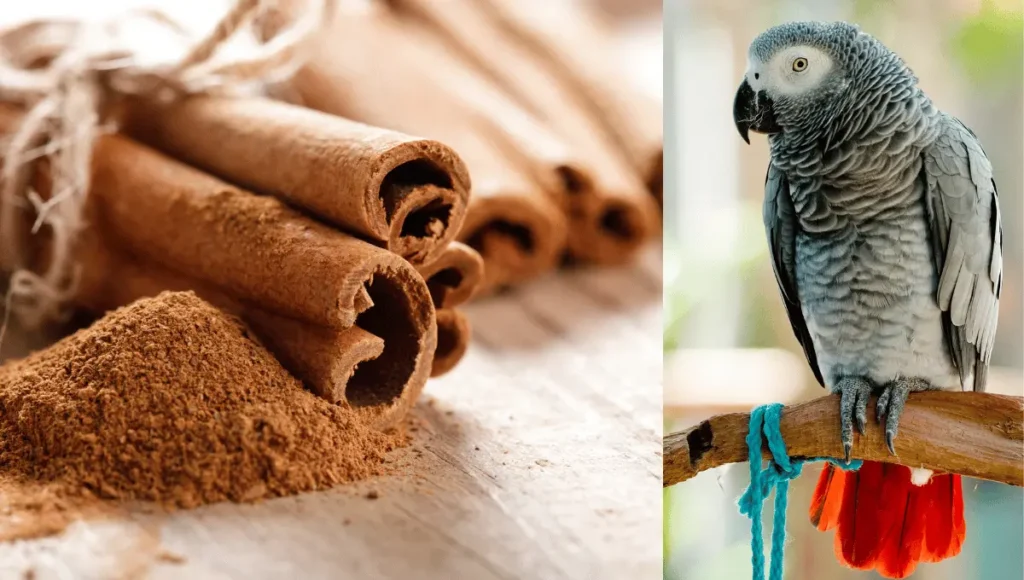Introduction
Parrots are curious eaters and enjoy trying new foods, but not everything is safe for them. This raises an important question: Can parrots eat cinnamon?
In this article, we’ll explore whether cinnamon is safe for parrots, its potential benefits, and any risks involved. You’ll also discover the best way to include this spice in your parrot’s diet. Keep reading to find out how cinnamon can fit into your bird’s meals!
What Do Parrots Normally Eat?

Natural Diet of Wild Parrots
In the wild, parrots enjoy a diverse diet that includes fruits, seeds, nuts, flowers, and even insects. This variety helps them get the nutrients they need to stay healthy and active. Wild parrots naturally seek out foods that match their energy needs and environmental conditions.
Nutritional Requirements for Pet Parrots
For pet parrots, it’s essential to mimic their natural diet as closely as possible. A well-rounded diet for parrots should consist of nutritious pellets, along with fresh fruits and vegetables. Some of the best fruits for parrots include apples, bananas, and berries, while vegetables like carrots, spinach, and broccoli provide essential vitamins and minerals.
Seeds and nuts can be included but should be offered in moderation, as they are high in fat. Pellets often serve as the primary source of nutrients, as they are specially designed to meet a parrot’s dietary needs.
Importance of Variety and Caution with New Foods
Parrots thrive on variety. Offering different foods not only meets their nutritional needs but also keeps them mentally stimulated. New foods should be introduced slowly and carefully to ensure your parrot adjusts well.
Parrots have sensitive digestive systems, and sudden changes can cause discomfort or health issues.
When adding something like cinnamon or other spices to their diet, it’s important to ensure that it’s safe and offered in moderation. Always observe your parrot’s reaction to new foods and consult a veterinarian if you’re unsure about their safety.
Is Cinnamon Safe for Parrots?

Types of Cinnamon: Ceylon vs. Cassia
Cinnamon comes in two main varieties: Ceylon cinnamon and Cassia cinnamon. Ceylon cinnamon is often referred to as “true cinnamon” and is considered the safer option for parrots. It has much lower amounts of coumarin, a substance that can be dangerous in high quantities.
Cassia cinnamon, on the other hand, has a higher coumarin content, which can be toxic to parrots if consumed in significant quantities. If you’re offering cinnamon to your bird, always choose Ceylon cinnamon to minimize any risks.
Can Parrots Consume Cinnamon in Moderation?
Yes, parrots can consume cinnamon in moderation. In small amounts, cinnamon can provide antioxidants and enhance the flavor of their food. Many birds enjoy the mild spice and unique scent. However, as with any treat, too much cinnamon can be harmful.
Excessive amounts, especially of Cassia cinnamon, can lead to digestive issues or long-term health problems due to coumarin. Stick to tiny sprinkles of Ceylon cinnamon on their food occasionally to ensure their safety.
Forms of Cinnamon: Stick, Powder, or Oil?
Cinnamon is available in several forms, but not all are suitable for parrots:
Cinnamon Sticks:
Parrots can chew on Ceylon cinnamon sticks, which can also provide enrichment through texture and flavor. Ensure they’re natural and free from additives.
Cinnamon Powder:
A small pinch of Ceylon cinnamon powder can be sprinkled on fruits or vegetables to add variety.
Cinnamon Oil:
Avoid cinnamon essential oils entirely. They are highly concentrated and can be toxic to parrots.
Parrots Eat Cinnamon
| Factor | Details |
| Can parrots eat cinnamon? | Yes, in small amounts. |
| Cinnamon type safe for parrots | Ceylon cinnamon (true cinnamon) is safer. |
| Potential risks | – High amounts may cause irritation or toxicity.-Cassia cinnamon contains coumarin, a compound that can be harmful in large doses. |
| Health benefits | – Antioxidants and anti-inflammatory properties (in moderation). |
| Signs of intolerance | – Vomiting– Diarrhea– Changes in behavior (e.g., lethargy) |
| Recommended serving | Small, infrequent amounts; avoid cinnamon with sugar or other additives. |
| Caution | It’s best to consult a vet before adding new foods to your parrot’s diet. |
Potential Benefits of Cinnamon for Parrots

Antioxidant and Antimicrobial Properties
Cinnamon is rich in antioxidants, which help fight free radicals in the body and support overall health. These antioxidants can help strengthen your parrot’s immune system and protect against illness. Additionally, cinnamon has antimicrobial properties, meaning it can help reduce harmful bacteria and fungi, supporting your bird’s overall wellness.
Support for Digestion and Immune Health
In small amounts, cinnamon can aid in digestion. Some parrots may benefit from the mild digestive boost that cinnamon provides. It helps regulate their stomach and can even assist in balancing gut health.
Moreover, the antimicrobial effects can contribute to a healthier digestive tract by preventing harmful bacteria from growing.
The spice also has compounds that may promote general immune system health, helping your parrot fight off infections and stay strong. This makes cinnamon a potential ally in maintaining your bird’s well-being when used correctly.
Stimulating Enrichment Through Scent and Flavor
Parrots are intelligent, curious birds that love new experiences. The smell and taste of cinnamon can be an exciting enrichment for your parrot, offering a new sensory experience. Introducing cinnamon in small amounts can make mealtime more interesting and enjoyable for your bird, which can help prevent boredom.
Risks and Precautions

Possible Allergic Reactions or Sensitivities
Just like humans, parrots can have allergic reactions to certain foods, including cinnamon. While rare, some birds may be sensitive to spices, which could lead to symptoms like itching, swelling, or digestive upset.
If you’re introducing cinnamon to your parrot for the first time, keep a close eye on them. If you notice any unusual behavior or physical changes, such as vomiting, diarrhea, or difficulty breathing, stop offering cinnamon and contact your vet immediately.
Risks of Using Cassia Cinnamon
Cassia cinnamon, while common and often cheaper, contains a substance called coumarin. In high amounts, coumarin can cause liver damage and other health issues in parrots. While small amounts may not cause immediate harm, it’s best to avoid Cassia cinnamon altogether.
If you do choose to give your parrot cinnamon, make sure it’s Ceylon cinnamon, which has much lower levels of coumarin and is safer for long-term use.
Importance of Moderation and Consulting a Vet
As with any treat, moderation is crucial when offering cinnamon to your parrot. Too much cinnamon can upset your bird’s stomach and cause long-term health problems, even if the type of cinnamon is safe. Stick to small amounts—just a pinch or sprinkle—and offer it occasionally, not daily.
Safe Spices for Parrots
Overview of Bird-Safe Spices
While cinnamon can be a safe treat when used correctly, there are other spices that are also safe and beneficial for parrots. These spices can add variety and flavor to your bird’s diet while offering some health benefits. However, just like cinnamon, they should be given in moderation.
Some bird-safe spices include:
- Turmeric: Known for its anti-inflammatory properties, turmeric can help support your parrot’s joints and digestive health.
- Basil: A fragrant herb with antioxidants, basil can help boost your bird’s immune system.
- Oregano: This herb has antimicrobial properties, making it great for supporting your parrot’s digestion and overall health.
These spices can be sprinkled lightly on your parrot’s food to offer new flavors and health benefits.
Spices to Avoid Completely
While many spices are safe for parrots, some should never be given to them. These can cause harm, ranging from digestive problems to toxicity. Avoid these spices at all costs:
- Nutmeg: Nutmeg contains a compound called myristicin, which is toxic to parrots and can cause seizures or other serious health problems.
- Garlic and Onion: Both garlic and onion contain compounds that can damage a parrot’s red blood cells, leading to anemia.
- Cloves: Cloves contain eugenol, which can be harmful to your parrot’s liver and digestive system.
These spices should never be added to your parrot’s diet, even in small amounts, as they can lead to dangerous health conditions.
Tips for Introducing Spices into a Parrot’s Diet
When introducing a new spice to your parrot’s diet, always start with small amounts. You can sprinkle a tiny pinch of safe spice on their food to see how they react. Watch for any signs of discomfort or allergic reactions, and consult a vet if needed.
How to Serve Cinnamon to Your Parrot
Suggested Methods: Sprinkling, Occasional Treats
When serving cinnamon to your parrot, it’s important to offer it in a way that is safe and enjoyable for them. The best way to serve cinnamon is by sprinkling a tiny amount of Ceylon cinnamon powder on their favorite fruits or vegetables.
For example, you can add a pinch of cinnamon to apple slices or sprinkle it on some sweet potato. This adds flavor and variety without overwhelming their diet.
You can also offer cinnamon sticks for your parrot to chew on. Parrots love to explore and chew, so a small stick of cinnamon can serve as both a treat and a form of enrichment. Just make sure it’s the Ceylon variety and free of any added chemicals.
Dosage Guidelines for Safe Consumption
Cinnamon should always be given in small amounts to avoid any potential health issues. A pinch of Ceylon cinnamon powder or a small piece of cinnamon stick once or twice a week is more than enough. Too much cinnamon, even the safe variety, can lead to digestive problems or irritation.
The key is moderation—cinnamon should be considered an occasional treat, not a regular part of their diet. Over time, you’ll learn what amount works best for your parrot. If your parrot enjoys it and shows no signs of discomfort, you can continue offering it as an occasional treat.
Monitoring Your Parrot’s Reaction
After introducing cinnamon to your parrot’s diet, pay attention to how they react. Most parrots will enjoy the new flavor, but some might not like it. Keep an eye out for any signs of discomfort, such as changes in their eating habits, unusual droppings, or behavior changes. If any of these occur, remove cinnamon from their diet and consult your vet.
Conclusion

In conclusion, while cinnamon can be a tasty and healthy treat for your parrot, it’s important to use it in moderation. Always choose Ceylon cinnamon, as it’s safer for your bird, and avoid Cassia cinnamon due to its higher coumarin content.
By offering small amounts and monitoring your parrot’s reaction, you can safely add this spice to their diet. Remember, variety is key to keeping your parrot’s meals exciting and nutritious. Always consult your vet if you’re unsure about any food, and enjoy watching your parrot discover new flavors!
FAQs
Can parrots eat cinnamon?
Yes, parrots can eat cinnamon, but only in moderation. It’s best to offer Ceylon cinnamon, as it is safer for your bird than Cassia cinnamon.
Is cinnamon safe for parrots every day?
No, cinnamon should only be given as an occasional treat. Too much cinnamon can cause digestive issues or other health problems.
What type of cinnamon is safe for parrots?
Ceylon cinnamon is the safest option for parrots, as it has lower levels of coumarin, which can be harmful in large amounts.
How should I serve cinnamon to my parrot?
You can sprinkle a small pinch of Ceylon cinnamon powder on fruits or vegetables, or offer small cinnamon sticks for your parrot to chew on.
What should I do if my parrot doesn’t like cinnamon?
If your parrot doesn’t enjoy cinnamon, don’t worry. Each bird has its preferences, and you can try offering other bird-safe spices or treats instead.
Pingback: Can Parrots Eat Peaches? Everything You Need to Know